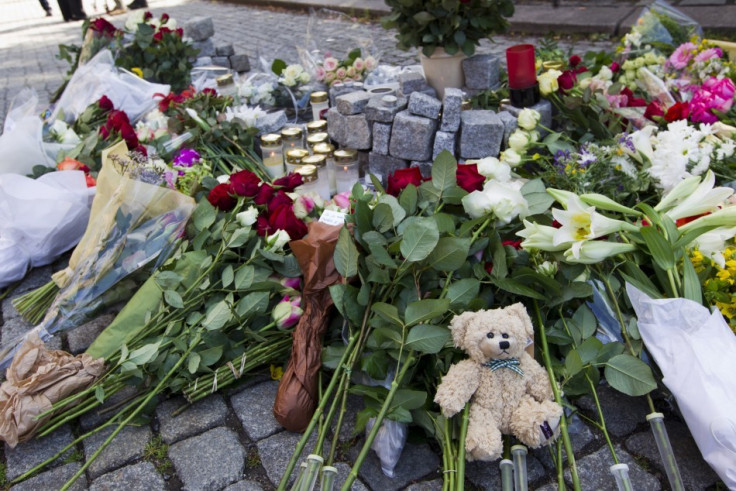Oslo Onlooker: The Atmosphere in the City is Full of Contrast

The death toll stands at 76. A man declared insane by his lawyer sits in a Norwegian jail cell reportedly unrepentant. Police stress that people should not be fearful of going about their daily lives. At the moment, Oslo, Utoya, Norway is a place of contrast.
"One moment you see the ruins of what used to be our Government HQ," says Henrik Vaaler, who was in Oslo when the bomb went off last Friday, "then you see people drink beer in the sun, then people gathering in thousands to cry with strangers in front of the cathedral and finally some tourists making a silly pose for a holiday picture."
Henrik had returned from England, where he is a student, to his native Norway for the summer. "I think the first thing to hit us in Oslo was the shock."
Working as an intern in the city he witnessed events as they unfolded. "The office is about 1 km away from the blast site," he says, "and the whole building shook vigorously. I thought it was an earthquake initially.
"After a bit it became clear that there had been an explosion. The city suddenly filled with smoke, people were walking, talking with uncertainty on their phones surrounded by tons of broken glass. The sense of danger first subsided after it was overtaken by an immense sense of grief for the massacre at Utoya. It was and still is so unbelievable."
Norway, as has been widely reported, is not used to such events. According to the Global Terrorism Database, a project from the University of Maryland that records terrorist attacks, between 1970 and 2010, 15 terrorist attacks occurred in Norway. By comparison, 2,347 acts of terrorism occurred in the United States (more information on the projects definition of an act of terrorism can be found here).
The severity of the blast led The Economist to label the Oslo bombing "the most devastating attack on a Scandinavian country since the second world war."
"I think the tragedy has hit the whole nation very hard," says Henrik. "We are a small country and everyone knows someone, or knows of someone, who has been killed. This gives a unique proximity to the event and the 24 hour media updates make the whole thing very vivid. People could not go to bed for the first few days - they were that captivated."
"I must admit, I was so glad yesterday when they finally started playing music on the radio again. It had been just too much information," adds Henrik.
Through the tragedy and the grief the world has also seen a country stand together. A country that saw more than 250,000 people march through the streets of Oslo to pay their respects to the victims of the attack. A country that has even seen its police force ask for compassion as "behind our uniforms is the average Norwegian citizen with feelings".
"I think it is beautiful to see how united the country has been," says Henrik. "All political difference has been shelved and people have grieved together. Even the king cried on television, which to my knowledge is unprecedented. It is hard to sum up what I feel. A song that keeps coming up, and was played at the church service on Sunday and at the Rose March on Monday is Til Ungdommen."
Til Ungdommen translates as To The Youth and was written in 1936 during the rise of Nazi Germany. Its historical context has garnered increasing relevance as Anders Behring Breivik, the man who admits to carrying out the attacks, becomes known for his far-right links.
One verse from the song reads: "Here is your defence against violence/ here is your sword/ the belief in our life/ the worth of mankind."
It is a message that was re-enforced by Prime Minister Jens Stoltenberg when he said: "You will not destroy us, you will not destroy our democracy and our idea for a better world. We are a small nation and a proud nation. No one will bomb us to silence. No one will shoot us to silence. No one will ever scare us away from being Norway."
The Government building that was hit by the bomb is still sealed off but reports say that there are no longer any major disruptions is Oslo. The national threat level has not been raised and Breivik is in police custody.
"Youth camps and several festivals have been called off in solidarity. The local elections that Norway is to have in September are still being held but the campaign is being postponed," says Henrik.
As the physical damage of the events that occurred on July 22 begin to be cleaned up, the questions around what led to the atrocity continue. Police investigate, lawyers interrogate and Breivik awaits his trial. Henrik adds: "I guess this is an interesting response as everyone says we will face the terror with more democracy."
The beer drinkers sitting against a backdrop of destruction is a contrast. In the same way, the democracy and formality of the investigation contrasts against the unruly atrocity that took place.
"The atmosphere in the city," says Henrik, "is full of contrast."
Follow Joe Rennison on Twitter here.
E-mail your story ideas to j.rennison@ibtimes.co.uk
© Copyright IBTimes 2025. All rights reserved.





















